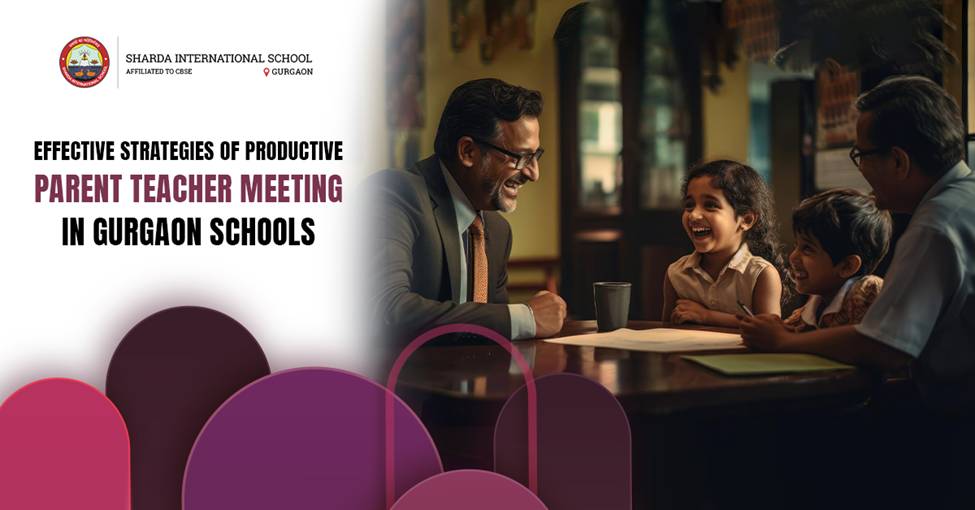Effective Strategies for Productive Parent and Teacher Meetings in
Gurgaon Schools
 Parent and Teacher Meetings, often called parent-teacher
conferences or parent-teacher meets, are crucial for a child's
success in school. These meetings are a two-way street where
parents and teachers can discuss a student's progress, challenges,
and strengths. But how can we make sure these meetings are truly
productive and beneficial for everyone involved? So, in today’s
blog let’s learn effective strategies for productive collaboration
between parents and teachers.
Parent and Teacher Meetings, often called parent-teacher
conferences or parent-teacher meets, are crucial for a child's
success in school. These meetings are a two-way street where
parents and teachers can discuss a student's progress, challenges,
and strengths. But how can we make sure these meetings are truly
productive and beneficial for everyone involved? So, in today’s
blog let’s learn effective strategies for productive collaboration
between parents and teachers.
Understanding Parent-Teacher Collaboration
Imagine a child as a plant. The teacher provides sunlight and
water (knowledge and guidance) to help the plant grow. Parents, on
the other hand, are the roots that provide stability and
nourishment from home. When parents and teachers work together,
they create the perfect environment for a child to flourish. This
collaboration is what we call Parent and Teacher Meeting or
collaboration.
The Importance of Parents Teacher Collaboration
Think about it this way: a child spends a significant amount of
time at school, but also a significant amount of time at home.
Think of a student's education as a three-legged stool. One leg is
the student, another is the teacher's guidance, and the third is
parental support. When all three legs are strong and working
together, the stool stands tall and sturdy. Strong Parent and
Teacher Meeting strengthens all three legs, leading to better
student outcomes.
Working together, parents and teachers can ensure a consistent and
supportive learning environment for the child in both places. This
collaboration can lead to:
- ➔ Improved academic performance
- ➔ Stronger social-emotional development
- ➔ Increased motivation and engagement
- ➔ Early identification of learning difficulties
Benefits of Parent and Teacher Meetings
The benefits of effective Parent and Teacher Meetings extend far
beyond just grades and test scores. Here are some additional
advantages:
Reduced student behavioral issues
When parents and teachers are on the same page about expectations
and consequences, it can lead to fewer behavioral problems in the
classroom.
Improved communication and trust
Regular meetings and open communication build trust and
understanding between parents and teachers. This can help address
any concerns that may arise later.
Stronger school community
When parents feel connected to the school and involved in their
child's education, it creates a more positive and supportive
learning environment for everyone.
Tailoring Support for Individual Student Needs
Every child learns differently. A one-size-fits-all approach
doesn't work. During parent-teacher meetings, discuss your child's
unique strengths in parent-teacher meet, weaknesses, and learning
styles. Together, you and the teacher can create a plan to support
your child's individual needs. This might involve:
-
➔ Instead of just saying a student is struggling, share concrete
examples of their challenges and areas for improvement.
-
➔ Work together to create a plan to address the student's needs.
This plan could include specific strategies for both parents and
teachers to use at home and in school.
-
➔ Establish clear and measurable goals for the student's
progress. This will help everyone track their success and make
adjustments as needed.
Building Trust and Rapport
Developing trust and rapport between parents and teachers is
essential for effective collaboration. Meetings provide an
opportunity to get to know each other better, understand each
other's perspectives, and build a strong foundation for open
communication. When parents feel comfortable talking to the
teacher and vice versa, it fosters a more supportive environment
for the student.
Parent Feedback and Input: Valuing Perspectives
Parents are the experts for their children. During meetings,
parents should be encouraged to share their feedback and concerns.
Teachers can learn valuable information about the child's home
life, learning style, and any challenges they might be facing.
This two-way communication during parent teacher meet allows for a
more holistic understanding of the student, leading to better
support strategies. Here's how:
Encourage open communication
Make sure parents feel comfortable sharing their concerns and
questions.
Ask for their insights
Ask parents about their child's strengths, interests, and learning
styles at home.
Incorporate feedback into the plan
Consider parents' suggestions when developing strategies to
support the student.
Conclusion
Parent teacher meet are an important opportunity to establish a
strong partnership focused on your child's success. Furthermore,
emphasizing the importance of an
innovative learning environment
ensures that both parents and teachers are committed to providing
holistic support for every child’s journey towards academic
excellence and personal development. At Sharda International
School, we are committed to promoting open communication and
cooperation between parents and teachers. We encourage you to take
an active part in Parent and Teacher Meetings and share your
valuable insights to help your child reach their full potential.